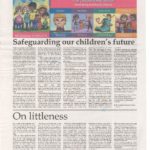Safeguarding our children’s future – Malta Independent August 2016
What would the world be like in years to come if tomorrow’s parents, leaders and policy makers had the skills to resolve conflicts?
Would it be too much to dream that families could deal with arguments and resolve them rather than break up, or that leaders could come together to find ways to create synergies and find solutions to problems for the common good of all?
For such a dream to become reality, we need to sow the seeds today, as the children of today will be the parents and leaders of tomorrow.
Often parents dedicate time to solve their children’s problems, such as those that occur at home or with friends at school. While this helps the child solve the immediate issue, they may actually be missing an opportunity to teach their children the skills which would serve them a life time.
It is understandable that focus is put on children’s academic achievement as this will increase the possibility of building a career and finding a good job. However, equally important, is the need to share conflict resolution skills and experiences with them which will help them later in life. Conflict resolution skills are one of the foundation blocks they should learn, to build true friendships with their friends at school and in their families today.
“Give a man a fish and he will eat for a day, teach a man to fish and he will eat for a lifetime.”
This is the principal that sparked the creation of Friendship cards, an innovative tool to help children develop communication and conflict resolution skills. Friendship cards were created by a voluntary foundation ‘Relationships are Forever” Foundation, founded by Joanna and Julian Sant Fournier who worked together with a team of volunteers of PSCD teachers, designers, artists and other professionals. The team voluntarily dedicated their time and talent for two years to realise this project.
Friendship cards consist of a set of beautifully illustrated skill cards which are intended to help children learn a simple process of how to share feelings and develop conflict resolution skills. Even really good friends can still have arguments or disagreements. This is quite normal and necessary as it is actually part of the process of building a strong relationship. What is important is that children understand the process to be able to sort out the argument.
Friendship cards help children to process the argument into simple stages:
- Feel comfortable in saying how they feel, talking to each other and finding out what caused the argument.
- Realise that they may have said or done something wrong.
- Focus on taking positive steps and avoiding hurtful behaviour so that it is possible to make up and be good friends again.
The child will learn various strategies on how to tackle a situation with friends or parents. At the end of each cycle the relationship becomes stronger and develops on a deeper level. The colour coded Friendship cards also help children to develop emotional literacy as they can help to identify, understand, and respond to emotions in themselves and others in a healthy manner.
The message on each card is presented in simple sentences and beautiful colourful drawings, making the whole idea playful and attractive for children. The drawings in themselves help the children process the situation as they can associate themselves with the characters on the cards. Simple but carefully chosen questions on each card help children to think and talk making it easier to express themselves.
The harsh reality of today is that many children come from broken families and more than often experience difficult situations at home. With the use of these cards, a child could label an emotion, connect to a drawing on one of the cards and share what they are feeling with their teacher or parents. Being able to identify the problem the child has is priceless in a relationship.
These cards act as a tool which can be shared among families, at schools, in youth groups or any other controlled environment, and are a practical way for the children to experience new strategies and techniques. Children love to play. When combining fun with learning, the pedagogical process works at its best, as children experience and process the situation which in time leads to internalizing these new skills. Teachers, parents and children may learn more about the friendship cards initiative by attending a workshop given by “Relationships are Forever” foundation.
In a recent meeting between Pope Francis and the German Chancellor Angela Merkel, the Pope took the opportunity to talk about the need for dialogue. Pope Francis is convinced that contemporary societies must learn the arts and skills of pluralism; here he called for the next generation to be equipped with the tools of encounter, negotiation, and conflict resolution.
We are celebrating the year of mercy, which in essence is all about creating peace in the family. This is not an easy task by any means. If we want to create peace in the world we have to start working within the family, with the children who are the future and the parents of tomorrow.
More information on the friendship cards initiative be found on:http://www.friendshipcards.org/ or www.facebook.com/friendshipcards.org
Fr Hermann Duncan O.Carm
Balluta



